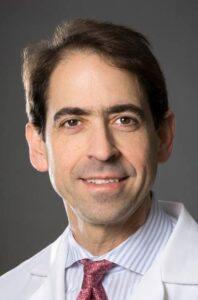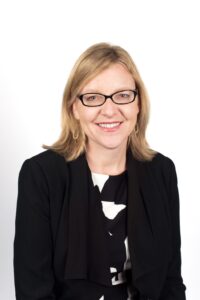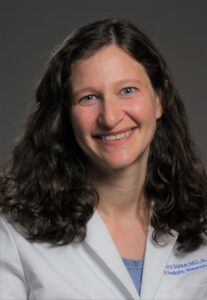 Wondering how best to care for an adult patient with juvenile idiopathic arthritis-associated uveitis or a pediatric patient with early-onset osteoarthritis? Unsure how to manage a 23-year-old with chronic nonbacterial osteomyelitis or an 8-year-old with tophaceous gout due to Lesch-Nyhan syndrome? Ask a Med-Peds rheumatologist.
Wondering how best to care for an adult patient with juvenile idiopathic arthritis-associated uveitis or a pediatric patient with early-onset osteoarthritis? Unsure how to manage a 23-year-old with chronic nonbacterial osteomyelitis or an 8-year-old with tophaceous gout due to Lesch-Nyhan syndrome? Ask a Med-Peds rheumatologist.
What Is a Med-Peds Rheumatologist?
Med-Peds rheumatologists in the U.S. are board-certified adult and pediatric rheumatologists. After medical school, they complete a four-year combined residency program in internal medicine and pediatrics (Med-Peds), followed by a four-year combined fellowship in adult and pediatric rheumatology (see Figure 1). Med-Peds rheumatologists represent a small, but growing, subset of the rheumatology workforce in the U.S. As of 2024, an estimated 56 Med-Peds rheumatologists are currently in practice, with an additional 10 currently completing their combined fellowships.

Figure 1: Med-Peds rheumatologists complete 12 years of graduate and post-graduate education. Any institution with an adult or a pediatric rheumatology fellowship may create a combined fellowship, alone or in partnership with another institution. (Click to enlarge.)
What Do Med-Peds Rheumatologists Offer to the Field of Rheumatology?
With their dual training, Med-Peds rheumatologists hold unique perspectives with the potential to address several challenges facing the field of rheumatology, including the expanding number of patients with pediatric-onset rheumatic diseases transitioning to adult care, the shortage of both pediatric and adult rheumatology providers and the overlapping nature of complex rheumatic diseases across the two patient populations. For patients cared for by Med-Peds rheumatologists, the continuity of care provided is extremely meaningful and may decrease loss of follow-up during young adulthood. In addition, many Med-Peds rheumatologists have made significant research contributions that stem from their dual training.
We asked three Med-Peds rheumatologists, each with a different focus, to discuss their careers.
Dr. Peter Nigrovic
Peter Nigrovic, MD, is a Med-Peds rheumatologist at Boston Children’s Hospital, where he is chief of the Division of Immunology. He also leads a basic and translational science lab that focuses on the mechanisms of inflammation in arthritis and systemic lupus erythematosus at Brigham and Women’s Hospital, Boston.
Why did you decide to pursue both adult and pediatric rheumatology?
Dr. Nigrovic: As a medical student, I spent time in Guatemala, and work in rural communities there convinced me that I wanted to be able to take care of the whole age spectrum. This is why I did Med-Peds. When I decided to specialize in rheumatology, I had already trained for several years in a way that emphasized the similarities, rather than the differences, between children and adults. I suspected there might be value in bringing this perspective into our field.
Tell us about your clinical practice of Med-Peds rheumatology.
Dr. Nigrovic: In 2005, I started the Center for Adults with Pediatric Rheumatic Illness (CAPRI) at the Brigham and Women’s Hospital (BWH) to provide both transition assistance and long-term care for adults whose rheumatic diseases began as children. Since that time, we have seen over 700 new patients, most transitioning from Boston Children’s Hospital, but also patients coming to Boston for college or adults with diseases that we see more often in childhood, such as Still’s disease and autoinflammatory diseases. CAPRI has attracted great rheumatology fellows, many of whom have stayed at BWH as CAPRI attendings with specialized expertise in these diseases.
Tell us about your research.
Dr. Nigrovic: I direct a basic and translational science laboratory at Boston Children’s Hospital that is focused on arthritis and lupus, but also related genetics and basic immunology, including, for example, neutrophil subtypes and the role of megakaryocytes in immunity. Recently, using both human and mouse systems, we described a population of T resident memory cells in joint tissues that form during inflammation and remain during remission to nucleate recurrent disease. Looking at CAPRI patients, many of whom were followed for over a decade, we showed that patients with arthritis display a corresponding phenotype that we term joint-specific memory (i.e., the tendency of previously inflamed joints to flare again). We believe these observations have important implications for arthritis management strategies.
How has your combined training influenced your clinical practice and research?
Dr. Nigrovic: Stepping back, it seems very clear that most rheumatic diseases are very similar in adults and kids, with some notable exceptions (e.g., early onset oligoarticular arthritis, Kawasaki disease, giant cell arteritis), although, of course, treatments need to be tailored to age and comorbidities, which differ across patients. When I speak about rheumatic diseases, I seek to highlight these similarities and to expose the very tenuous, often trivial historical bases for the sharp division rheumatology draws based on age of onset, something really no other specialty in medicine does. Where we can, we expose these similarities through research in the lab, for example, showing that causal genetic variants are shared across the age spectrum.
What would you say to a medical student or resident considering a career in Med-Peds rheumatology?
Dr. Nigrovic: It is a long road, but I have loved it. The extra two years are a small fraction of one’s professional life and were absolutely worth it for me. Adult rheumatology has great depth of clinical wisdom and research. Pediatric rheumatology is a wonderful, small community that works well together, including on biologically informative diseases, such as Still’s disease, and the autoinflammatory conditions, as well as inborn errors of immunity, that are more common in children.
Dr. Stacy Ardoin
Stacy Ardoin, MD, a Med-Peds rheumatologist at Nationwide Children’s Hospital and The Ohio State University, Columbus, conducts research on childhood-onset systemic lupus erythematosus and on the transition from pediatric to adult care for patients with rheumatic diseases.
Why did you decide to pursue both adult and pediatric rheumatology?
Dr. Ardoin: It seems that most people who choose Med-Peds like to keep their options open, and that was the case for me. I enjoyed caring for both adults and children and wanted to continue to be able to do so.
Tell us about your clinical practice of Med-Peds rheumatology.
Dr. Ardoin: Currently, my practice is more pediatric than adult as I am serving as the division chief for pediatric rheumatology. In the past, however, I have had the opposite ratio. My adult practice is limited to patients who have lupus or are transitioning to adult care from my pediatric clinic.
Tell us about your research.
Dr. Ardoin: I perform collaborative clinical research focused on lupus across the age spectrum. I have focused primarily on assessing cardiovascular risk in children and adults with lupus, helping optimize therapies for lupus nephritis and on developing strategies to improve the transition from pediatric to adult care.
How has your combined training influenced your clinical practice and research?
Dr. Ardoin: I find my pediatric experience makes me a better internist, as I am more likely to ask about, and strategize to overcome, barriers to care and understand the challenges facing young adults with childhood rheumatic disease. My adult experience makes me a better pediatrician, particularly in the care of very complex patients (who look more like internal medicine patients!) and in efficiencies in clinical care. My research tends to focus on transitions of care and long-term outcomes of childhood-onset disease, both of which are enhanced by my Med-Peds training and experience.
What would you say to a medical student or resident considering a career in Med-Peds rheumatology?
Dr. Ardoin: First, talk to some Med-Peds rheumatologists to get a sense of what they do. If you are not opposed to putting in more time, I think it is very worthwhile to do the combined training. Go for it!
Dr. Rebecca Sadun
Rebecca Sadun, MD, PhD, a Med-Peds rheumatologist at Duke University, Durham, N.C., investigates effective teaching strategies to assist pediatric and adult rheumatology fellows in developing the skills needed to successfully transition patients from pediatric to adult rheumatologic care.
Why did you decide to pursue both adult and pediatric rheumatology?
Dr. Sadun: First, I can’t imagine having to give up either adult or pediatric care, which is why I entered a Med-Peds residency in the first place. I love the joys of helping children learn to thrive despite a chronic illness, as well as the challenges of triangulating the patient-parent-physician triad; similarly, I love the intimacy of the one-on-one relationship we get to form with our adult patients. And I especially appreciate the opportunity to help teens and young adults take ownership of their medical care and navigate the transition from pediatric to adult care, while making a transition from dependence to independence in other aspects of their lives. It has been an added perk to be able to draw from the experiences and practices that are particular to pediatric or to adult care and have the opportunity to apply them, when appropriate, to the care of patients on the other end of the age spectrum.
Tell us about your clinical practice of Med-Peds rheumatology.
Dr. Sadun: I have a nice 50-50 split between pediatric and adult rheumatology in my clinical care. In addition to seeing patients in pediatric and adult clinics, I run a young adult rheumatology clinic specifically for patients aged 18–28 who are transitioning from pediatric to adult rheumatology care and need additional wrap-around services; this clinic has an embedded social worker and an embedded primary care physician, allowing us to provide a medical home within a subspecialty clinic. In addition, I do a few weeks per year of inpatient consult work for both pediatric and adult patients. One of my favorite parts of the job is getting to precept fellows in any of these clinical settings.
Tell us about your research.
Dr. Sadun: I am currently engaged in several lines of research. These include medical education scholarship, largely through the Childhood Arthritis and Rheumatology Research Alliance (CARRA) Medical Education Workgroup, where I have the opportunity to collaborate with faculty and fellows across the U.S. and Canada. I participate in clinical research focused on lupus with colleagues at my institution, on a national level through my work with the CARRA Lupus Committee and on an international level though collaborations examining outcomes for patients with pediatric-onset lupus. Finally, I conduct translational research focused on vaccine immunogenicity in the lupus population.
How has your combined training influenced your clinical practice and research?
Dr. Sadun: There are many ways in which my combined training has influenced my clinical practice. For most of the past decade, pediatric rheumatology has put more focus on recognizing and aggressively treating macrophage activation syndrome (MAS), and these principles have served me well in my care of adult patients. I have also made a commitment to teaching our adult fellows about MAS, and I frequently assist with difficult inpatient cases of MAS. (Editor’s note: Click here for more information
on MAS.)
On the flip side, I can bring an understanding of, and comfort with, newer medications, which typically receive U.S. Food & Drug Administration approval in adults first, to my pediatric practice, and I can serve as a resource to pediatric colleagues who are looking to begin to use these medications for pediatric patients. With regard to research, it is nice to have access to colleagues, grant opportunities, research communities and other resources on both sides. What would you say to a medical student or resident considering a career in Med-Peds rheumatology?
Dr. Sadun: I am so glad that I pursued the combined training. I love being able to draw on things I’ve learned in one context and apply it to the other—and I love being able to care for patients of all ages, especially when I can offer multigenerational care and when I can care for a patient as they are transitioning from the pediatric world to adult rheumatology care. It’s a joy and an honor to be part of big transitions in people’s lives, and it’s an incredible privilege not to have to say goodbye to your patients when they reach a certain age.
In Sum
Med-Peds rheumatologists are board certified in both adult and pediatric rheumatology. Their dual training affords them unique perspectives in clinical practice as well as research. Trainees interested in pursuing a career in Med-Peds rheumatology or program leaders interested in training a Med-Peds rheumatology fellow can reach out to Dr. Nigrovic or the author.
 Sarah D. Bayefsky, MD, is a fourth-year adult and pediatric rheumatology fellow at the University of Pennsylvania, Philadelphia, and Children’s Hospital of Philadelphia.
Sarah D. Bayefsky, MD, is a fourth-year adult and pediatric rheumatology fellow at the University of Pennsylvania, Philadelphia, and Children’s Hospital of Philadelphia.



